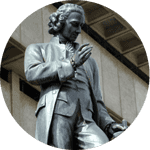
Dr. Joseph Priestley (1733-1804)
Minister at Birmingham Lower Meeting House (where New Street Station is today), from 1780-1791. He was a man of immense intellect, speaking ten languages and undertook scientific experiments as a spare time activity. He discovered the element Oxygen and was elected a Fellow of the Royal Society and awarded its Gold Medal. He was also awarded a Doctorate in Law. He was an enthusiastic member of the Lunar Society, a monthly gathering of distinguished men who met to discuss their scientific observations and experiments. Their numbers included Matthew Boulton, James Watt and Josiah Wedgwood. Priestley was also an assiduous student of the scriptures and aroused intense hostility from the Church of England by concluding that Jesus was not the Son of God but a human being who had led an exemplary life. He strongly upheld freedom of enquiry, the authority of conscience rather than dogma and the critical use of reason in religion. Despite the antipathy which this created, his methodology was widely admired and copied. Priestly was a strong believer in civil and religious liberty and spoke out boldly about the need for social reform and greater justice for the common man. He was a great friend of Benjamin Franklin, the American Ambassador to the Court of France. All of this aroused the ire of the Government as well as the Church of England and on the second anniversary of the French Revolution, a mob was incited to attack and burn both the Lower Meeting House and Priestley’s home and laboratory. Priestley fled to London and shortly afterwards to America where he founded the first American Unitarian Church in Philadelphia.
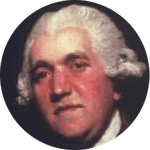
Josiah Wedgwood (1730-1795)
A great friend of Priestley’s, a member of the Lunar Society, a Fellow of the Royal Society, and a supporter of the Old Meeting House in Newcastle under Lyme where his Brother-in-Law, William Willett, was the Unitarian Minister. He was a world famous potter and his invention of the pyrometer – designed to measure the temperature in his kilns – earned him a commendation as a Fellow of the Royal Society.
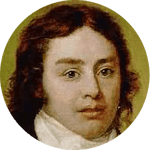
Samuel Taylor Coleridge (1772-1834)
At one time planned to be a Unitarian Minister. In January, 1796, he preached at Birmingham New Meeting and also at the High Pavement Chapel in Nottingham. Later that month, he preached on ‘Peace and War’ at the High Street Chapel, Shrewsbury. His audience included William Hazlitt, who was the son of William Hazlitt, until 1813, the Unitarian Minister at Wem in Shropshire.
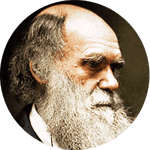
Charles Darwin (1809-1882)
The son of Josiah Wedgwood’s daughter who married Dr. Erasmus Darwin, the well known 18th Century physician, poet and intellectual. Charles attended High Street Chapel, Shrewsbury as a youth before starting to read medicine at Edinburgh, which he dropped to attend Cambridge to read for the church. In 1831, he joined the voyage of the Beagle as a naturalist. His observations during the voyage prompted him to develop a new evolutionary theory that the development of all forms of life occurs through the slow-working process of natural selection. He set out these ideas in his book The Origin of Species.
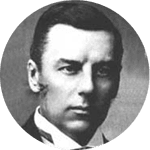
Joseph Chamberlain (1836-1914)
Elected Mayor at the age of 37 after making his fortune with his cousin Joseph Nettlefold in screw-making, in 1873. Influenced by George Dawson, the Unitarian Minister of Edward Street Chapel, and by Henry William Crosskey, the Unitarian Minister of his own Congregation, Birmingham New Meeting, and his brother-in-law, William Kenrick, Chamberlain used his considerable gifts of oratory to launch a programme of social reform which became known as the ‘Civic Gospel’. He reorganised the finances of the Corporation and municipalised Gas, Water, Electricity and revolutionised public safety, housing, education and town planning, sweeping away the slums and erecting many fine public buildings. When Birmingham attained City status in 1889, it was described as ‘the best governed city in the world’. After his unopposed election to Parliament in 1876, Chamberlain devoted the next seventeen years to the pursuit of a national policy of housing and land reform.
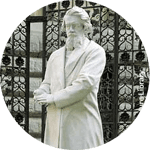
George Dawson (1821-1876)
A brilliant lecturer and preacher who broke away from the Baptists to start his own Unitarian Church of the Saviour in Edward Street, Birmingham in 1847. The church had a paid choir and its own hymnbook – largely written by Dawson. He was a very active Social Reformer and a strong influence on Joseph Chamberlain. It was largely due to Dawson’s efforts that Aston Hall and part of its park was saved for the people of Birmingham. He was also largely responsible for the opening of the first public library in Birmingham. After his death and the closure of Edward Street Church some years later, £900 was contributed towards the building of Waverley Road Church and its church hall, named after Dawson. It was one of the first to appoint a woman Minister, Gertrude von Petzold.
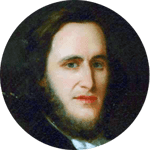
Henry Crosskey (1826-1893)
Born in Sussex and served as Minister at the Unitarian Church in Glasgow before moving the Birmingham as Minister of the New Meeting in 1869. He was a champion of women’s suffrage, in his younger years supporting the Derby Ribbon Weavers strike. In Birmingham he was a member of the School Board for sixteen years, fighting to abolish sectarian religious education in schools, to introduce classes in science and to secure merit-based salary increases for teachers. He is famously quoted as saying: ‘a bad teacher was dear at any price’. Following in the tradition of Priestley, he took a keen interest in natural history and became a leading authority on glacial geology in the Midlands, bequeathing his large collection of glacial erratics to the Lapworth Museum.
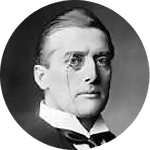
Austen Chamberlain (1863-1937)
The eldest son of Joseph Chamberlain and a half-brother of Neville Chamberlain was a member of Birmingham New Meeting. He entered Parliament in 1892 as a Liberal but, in company with his father, transferred to the Conservative Party and served as Chancellor of the Exchequer from 1903-1906. During the First World War, he served under Lloyd George as Lord Privy Seal. He was briefly Leader of the Conservative Party in 1921 but gave way to Stanley Baldwin and served as Foreign Secretary under Baldwin from 1924-1929. In 1931, he was appointed as First Lord of the Admiralty but decided to leave politics and died in 1937.
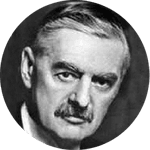
Neville Chamberlain (1869-1940)
A half-brother of Austen Chamberlain, was also a member of Birmingham New Meeting. He left Rugby School in 1890 and spent seven years running his father’s plantation in the Bahamas. On his return to Birmingham he went into the copper-brass business and was active in local politics, becoming Lord Mayor of the City 1915. In 1918, he became Conservative MP for Ladywood. In 1923, Stanley Baldwin appointed him as Postmaster General and in 1924 as Minister of Health. He served Ramsay McDonald as Chancellor of the Exchequer from 1931-1937, abolishing the Poor Law and reorganising Unemployment Assistance. He became Prime Minister in 1937 but in 1938 he was tricked by Hitler at Munich into abandoning the Czechs. This earned him popularity amongst the British people for avoiding War, but when War did break out he was forced to resign and died shortly afterwards.

Tim Berners-Lee (1955- )
The inventor of the World Wide Web and a member of our church in Boston where he works at the world-famous Massachusetts Institute of Technology as a Professor and Director of the World Wide Web Consortium. Now 48, Berners-Lee was born in Surrey to parents who both worked on the development of the early commercial computer, the Ferranti 1. With a strong mathematical bent, he built his first computer as an undergraduate at Oxford, using a soldering iron, a microprocessor chip and old television set. He went on to take First Class Honours. After working for various software companies, he secured an appointment at CERN, the leading-edge research centre into particle analysis in Geneva. Faced with the problem of achieving ready access to the vast store of information within the project, he conceived the idea of creating an abstract information space and obtained the go ahead to write the software for the world wide web. When fully developed, this allowed a person working at one computer to search for information across the network of computers linked up to the system throughout the world. What started only fourteen years ago has become a world wide industry which allows us to send emails, purchase goods, manage our bank accounts on-line, book holidays and search for information on almost any topic you care to name. But what makes Berners-Lee special, is his altruistic decision to make his invention available without charge for the benefit of mankind. His contribution to society has been recognised by the award of a knighthood in 2004 and by his appointment to the Order of Merit in 2007.